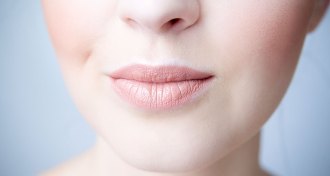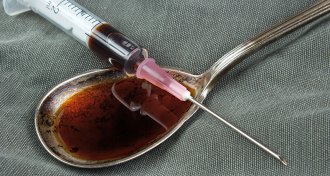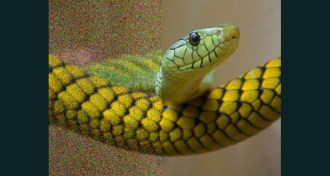
Bethany Brookshire
Bethany Brookshire was the staff writer at Science News for Students from 2013 to 2021. She has a B.S. in biology and a B.A. in philosophy from The College of William and Mary, and a Ph.D. in physiology and pharmacology from Wake Forest University School of Medicine. She is also a host on the podcast Science for the People, and a 2019-2020 MIT Knight Science Journalism Fellow.

Trustworthy journalism comes at a price.
Scientists and journalists share a core belief in questioning, observing and verifying to reach the truth. Science News reports on crucial research and discovery across science disciplines. We need your financial support to make it happen – every contribution makes a difference.
All Stories by Bethany Brookshire
-
 Health & Medicine
Health & MedicineBuilding standards aren’t to blame for chilly offices
A recent study made headlines for finding differences between men and women in comfort level for heating and cooling. But that’s not why women are cold in the office.
-
 Health & Medicine
Health & MedicineHow trans fats oozed into our diet and out again
Trans fats are no longer “generally recognized as safe” by the FDA. In a world where we want to have our doughnuts and eat them, too, it’s back to the drawing board, and back to butter.
-
 Health & Medicine
Health & MedicineThe weekly grind of social jetlag could be a weighty issue
Even those of us with nine-to-five jobs don’t always respect our body’s clocks. Research shows that even slight disruptions might be associated with obesity.
-
 Life
LifeShifted waking hours may pave the way to shifting metabolism
Shift workers are at higher risk for obesity and metabolic problems. Scientists are working hard to understand why the night shift makes our hormones go awry.
-
 Life
LifeWomen blush when ovulating, and it doesn’t matter a bit
Women don’t signal their fertility in obvious ways like nonhuman primates. A new study shows that even skin flushes are too subtle to detect.
-
 Science & Society
Science & SocietyNo matter the language, disease risk is hard to communicate
Reassuring messages about MERS might seem designed to stop panic. But in reality, people need to hear the truth, even if it’s uncertain.
-
 Plants
PlantsPoppy yields the final secret to making morphine
Scientists have successfully transplanted most of the morphine synthesis pathway from poppies to yeast. Now the final step is ready to be put in place.
-
 Psychology
PsychologyThe guilty pleasure of funny cat videos
Many people love posting and looking at cute kitty content online. A new survey shows that this could be because it helps us manage our emotions.
-
 Science & Society
Science & SocietyHome-brewed heroin: Hold the hype
Now is the time to think about policy for synthetically produced morphine, but the process, if it bears out, is years away from working.
-
 Science & Society
Science & SocietyTech in the classroom foreseen 50 years ago
Fifty years ago, scientists were looking forward to technology in the classroom.
-
 Neuroscience
NeuroscienceDiet and nutrition is more complex than a simple sugar
A new study shows that fructose may leave you wanting more when compared to the same dose of glucose. But in studies of single nutrients, it’s important to be cautious.
-
 Neuroscience
NeuroscienceA vivid emotional experience requires the right genetics
A single gene deletion gives some people an extra vivid jolt to their emotional experience, a new study shows.